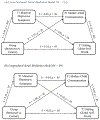Associations between parental depression, communication, and self-worth of siblings bereaved by cancer
- PMID: 37676170
- PMCID: PMC10841243
- DOI: 10.1037/fam0001137
Associations between parental depression, communication, and self-worth of siblings bereaved by cancer
Abstract
A child's death from cancer may increase the risk for poor self-worth in bereaved siblings. Furthermore, bereaved parents may experience depressive symptoms and communicate differently with their surviving children. However, limited research has examined family factors associated with self-worth in bereaved siblings. Thus, we examined: (a) differences in parental depressive symptoms, parent-child communication, and sibling self-worth between bereaved and nonbereaved families and (b) indirect effects of parental depressive symptoms and communication quality on the association between bereavement and sibling self-worth. Bereaved parents and siblings were recruited 3-12 months after a child's death from cancer. Bereaved (n = 72) and nonbereaved families of classmates (n = 58) completed home-based questionnaires upon enrollment (T1), and 48 bereaved and 45 nonbereaved families completed 1-year follow-up (T2). Relative to controls at T1 and T2, bereaved mothers, but not fathers, reported more depressive symptoms. Bereaved siblings reported poorer maternal and similar paternal communication, and similar levels of self-worth compared to controls. Both cross-sectional and longitudinal serial mediation models for mothers were significant. Bereaved mothers were at greater risk for depressive symptoms, which adversely affected sibling self-worth over time through disrupted mother-child communication. The father sample was limited, but the cross-sectional model was nonsignificant. Mothers and fathers may grieve differently and may require different therapeutic approaches. Family-centered interventions should target bereaved mothers' emotional adjustment and communication to enhance sibling self-worth. Additionally, clinicians should bolster other sources of support for bereaved siblings to promote adaptive outcomes. (PsycInfo Database Record (c) 2023 APA, all rights reserved).
Figures
Similar articles
-
The Influence of Parent Distress and Parenting on Bereaved Siblings' Externalizing Problems.J Child Fam Stud. 2020 Apr;29(4):1081-1093. doi: 10.1007/s10826-019-01640-0. Epub 2019 Dec 10. J Child Fam Stud. 2020. PMID: 33343178 Free PMC article.
-
Psychosocial outcomes in cancer-bereaved children and adolescents: A systematic review.Psychooncology. 2018 Oct;27(10):2327-2338. doi: 10.1002/pon.4863. Epub 2018 Sep 11. Psychooncology. 2018. PMID: 30120901
-
Changes in Siblings Over Time After the Death of a Brother or Sister From Cancer.Cancer Nurs. 2019 Jan/Feb;42(1):E20-E27. doi: 10.1097/NCC.0000000000000573. Cancer Nurs. 2019. PMID: 29489479 Free PMC article.
-
The Indirect Effect of Positive Parenting on the Relationship Between Parent and Sibling Bereavement Outcomes After the Death of a Child.J Pain Symptom Manage. 2016 Jan;51(1):60-70. doi: 10.1016/j.jpainsymman.2015.08.011. Epub 2015 Sep 18. J Pain Symptom Manage. 2016. PMID: 26387829
-
A longitudinal study of Latino and non-Hispanic mothers' and fathers' depressive symptoms and its association with parent-child communication.J Affect Disord. 2018 Feb;227:580-587. doi: 10.1016/j.jad.2017.10.046. Epub 2017 Oct 31. J Affect Disord. 2018. PMID: 29172050 Free PMC article. Review.
References
-
- Achenbach TM, & Rescorla L (2003). Manual for the ASEBA adult forms & profiles. In: Burlington, VT: University of Vermont, Research Center for Children, Youth, and Families.
-
- Alam R, Barrera M, D’Agostino N, Nicholas DB, & Schneiderman G (2012). Bereavement experiences of mothers and fathers over time after the death of a child due to cancer. Death studies, 36(1), 1–22. - PubMed
-
- Appelbaum M, Cooper H, Kline R, Mayo-Wilson E, Nezu A, & Rao S (2018). Journal article reporting standards for quantitative research in psychology: The APA Publications and Communications Board task force report. American Psychologist, 73(1), 3. - PubMed
-
- ASEBA. (2022). Adults (ABCL, ASR). Retrieved from https://aseba.org/adults/
-
- Barnes HL, & Olson DH (1985). Parent-adolescent communication and the circumplex model. Child development, 438–447.
MeSH terms
Grants and funding
LinkOut - more resources
Full Text Sources
Medical


